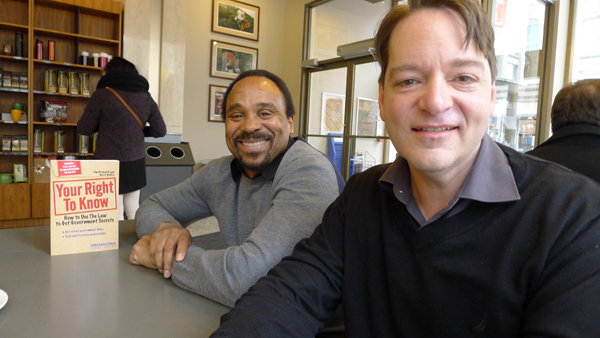A few blocks away from Parliament Hill in Ottawa, at a coffee shop at Sparks and Metcalfe streets, is where it seems the real schmoozing is done as far as government business goes.
Most of the customers are well dressed with briefcases, making it easy to suspect them as civil servants. The parliamentary ID tags around their necks are a stone-cold giveaway.
The spot is also where veteran investigative journalists David McKie and Jim Bronskill came to talk with The Tyee about their new book, Your Right to Know; How to use law to get government secrets.
The guide is aimed at teaching the public the skills to get the information that many sipping their java at Sparks and Metcalfe already know.
''It's a citizen's guide,'' said Bronskill. ''This is a tool that, more and more, average people are using and that fascinates us.''
The duo also hope it will have an impact on the public's interest in access to government information and ''create an expectation'' for government openness.
Bronskill is based in Ottawa as a national reporter for the Canadian Press while McKie is a national producer with CBC News based in the organization's Parliament Hill bureau. The two co-teach a course in the Carleton University journalism school on reporting methods.
They often assign their students the task of pursuing a story through access to information legislation and would love to see the general public doing so too, much more frequently.
''Our hope is that once they realize how important and essential this, they will start making demands of their politicians,'' McKie said. ''To put pressure on the powers that be to change the system to make information easier to get, to make a basket of records more routinely released.''
Access laws 'should be a last resort'
That pressure would also hopefully involve forcing bureaucrats to write down more information, which the duo said has been on the decline since the Somalia inquiry in 1993 where Canadian soldiers killed a Somali teen. The scandal led to the discovery of serious problems in the country's military via government documents.
Bronskill said access laws should really be a last resort, and that individuals should be able to ask for information from government and get it back the same day, which is currently not the case.
Obtaining government records can be a time-consuming and costly endeavour, depending on the level and department. Some governments charge an initial fee for filing an access to information request, but it's the fees governments charge to search for the records that can really add up, and even scare a citizen out of pursuing their request.
Fees can range in the thousands of dollars because the government says the resources used for the searches must be paid for by someone. But Bronskill said if the government made much of the information public to start, the resources wouldn't have to be strained.
''Ideally all government information, within reason, would be available for the asking. It would be online; minutes of meetings would be posted regularly, every bit of expense report you would want to see is posted,'' Bronskill said. ''Then you'd see the number of (ATIP) requests go down.''
But the most important part of the process, the pair agreed, is that a person carefully reads the records they receive, or else there's not much point in fighting to obtain them.
''You have to make demands if you're not getting what you want,'' McKie said. ''If we all just threw up our hands and gave up on it, the government wins, and we're stuck with the system that we deserve.'' ![]()
Read more: Politics, Federal Politics
















Tyee Commenting Guidelines
Comments that violate guidelines risk being deleted, and violations may result in a temporary or permanent user ban. Maintain the spirit of good conversation to stay in the discussion.
*Please note The Tyee is not a forum for spreading misinformation about COVID-19, denying its existence or minimizing its risk to public health.
Do:
Do not: